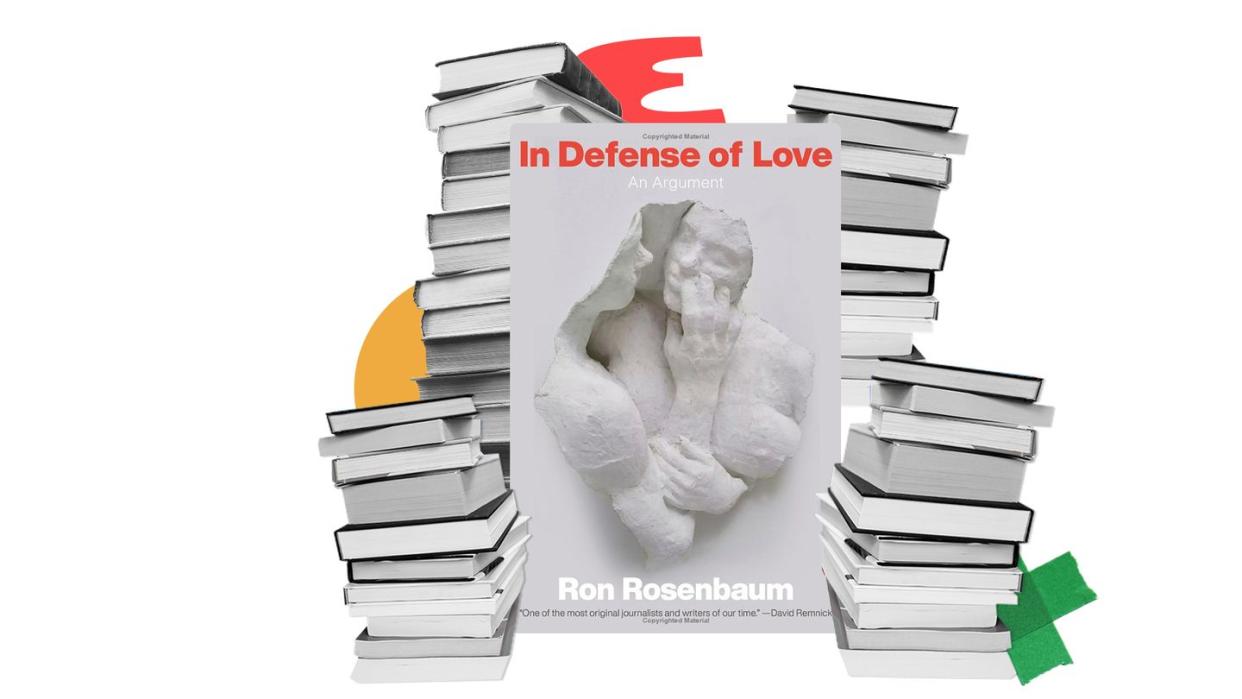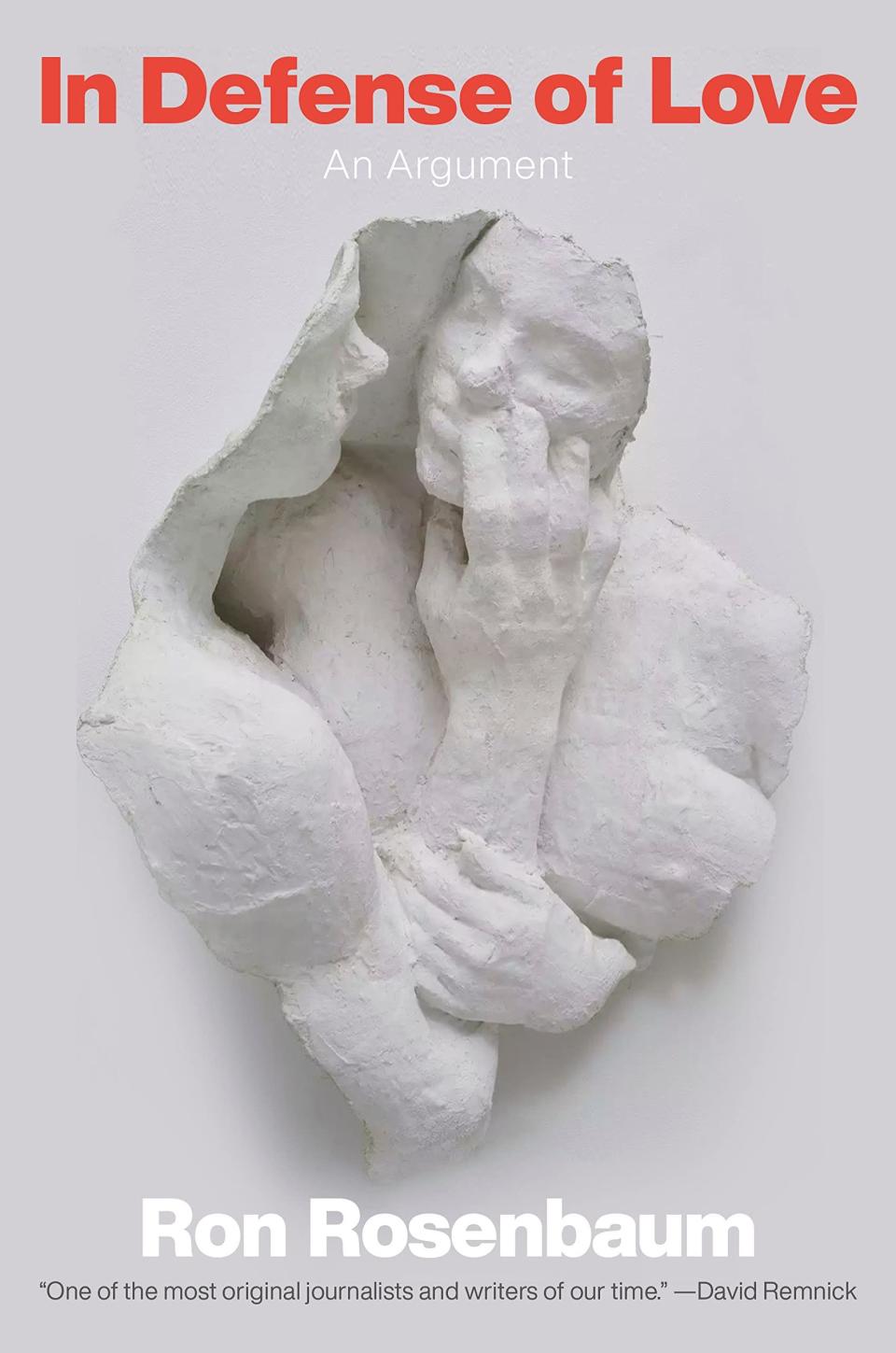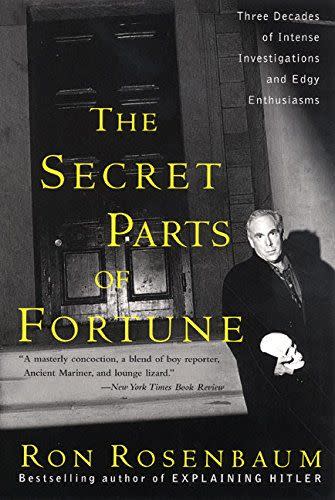Love Is Under Attack By Silicon Valley

- Oops!Something went wrong.Please try again later.
"Hearst Magazines and Yahoo may earn commission or revenue on some items through these links."
Love songs mean a lot to Ron Rosenbaum. In fact, he used to style himself as “The Midnight DJ of Love” and send his partner a new love song each night. She’d send one back. It’s one of the ways the 76-year-old journalist bonded with his lover, whom he calls “Miss X” to maintain her privacy. It’s a tradition that has brought them closer over the years. It reminds them of the power of love.
Love’s magic has long been one of Rosenbaum’s obsessions, and now he’s tackling the subject with his new book, In Defense of Love: An Argument. Rosenbaum believes love is under attack from Silicon Valley, where apps and formulas for finding a partner are not about finding love, but rather about creating a system to profit off the idea of solving an unsolvable mystery. According to the Pew Research Center, 53% of adults under 30 have used a dating site or app. 37% of people ages 30 to 49 have tried online dating, while the numbers drop once people hit 50 for various reasons. As people swipe right and left, the mystery of love has increasingly transformed from meeting in person to feeding an algorithm. According to Rosenbaum, the mystery is becoming less a mystery and more often a commodity for tech giants to sell to us.
“There is a battle going on, a battle for the soul of love,” Rosenbaum writes. “The very identity, the existence, of what we, most of us—and five thousand-plus years of poets, songwriters, storytellers, and love-struck amateurs— thought of as love, is now a matter of contention between the poets and the reductionists. The latter of whom claim that love as we have known it is not even an emotion.”
Rosenbaum is one of the great magazine writers of the 20th century. He’s a singular voice who has written for The Village Voice, The New Yorker, and Esquire. What Rosenbaum sets out to explore with In Defense of Love is the nature of how love has been co-opted (like much of the rest of our lives) by tech companies trying to explain the world for us. Love, according to Rosenbaum, is being sold to us as something that can be created and catered to us instead of nurtured. It’s no longer about feeling, but rather about algorithms and gurus matching us via our preferences and supposed personalities. What the world has tried to do is turn the love song into a formula. It’s trying to take that feeling and commodify it.
I met Rosenbaum near his apartment in New York City. The aging author is immunocompromised and asked to talk at an outdoor restaurant nearby. He walked over using a walker with bags dangling from it, filled with notebooks and books in case he fell, had to go to the hospital, and needed something to do there. We sat in the hot sun next to a bustling street with traffic, ambulances, and firetrucks roaring by, talking about his new book, what love has meant to him, and how he became so afraid that it’s being co-opted by tech and pseudoscientists. When I left, I thought of a song by The Magnetic Fields, “The Book of Love,” which has been covered by the likes of Peter Gabriel and boasts its own Spotify playlist of covers. There’s a line the song ends with that has stuck with me ever since I first heard it years ago: “The book of love has music in it. In fact, that's where music comes from.” I wish I had thought of it when I was talking to Rosenbaum about his favorite love songs. You’ll find his list of favorites printed below our talk, which has been edited for length and clarity.
ESQUIRE: What was your inspiration for this book?
RON ROSENBAUM: I found that there was a lot of pop science that seemed to be explaining love. To put it in the most simplistic terms, in tenth grade biology, I dissected a frog, but you can't dissect love like you dissect a frog.
No one has succeeded, as far as I can see, at scientizing love. There are theories in which love is a bunch of particles, but then particles don't feel. There is the antigen theory that love is discernible with smell. Although, it's still a particle theory, because antigens are foreign bodies that sense and trigger histamine. So, the histo-incompatibility theory is that if you get two people with incompatible antigen sensitivities, they're drawn to each other because their offspring will have a blended immune palate and a greater immune defense.

$27.00
amazon.com
What I investigated and what I wrote about was that love escapes these various scientific theories that are almost all particle theories, because particles don't feel, and no one has explained what that feeling of love is. What is it made of? Is it made of sunshine and lollipops? There's very little questioning of it. Helen Fisher is on about a billion TV shows and podcasts with her FMRI [Functional Magnetic Resonance Imaging] study. It just gets you traces of chemicals in the cortex, but is that love, or is the tracing of the trace theory of the chemicals love?
My interest in love came from being in love. Actually, the whole idea of writing about love really grew out of talking to former Esquire editor Betsy Carter. We used to talk about love songs all the time. What made them so powerful? I think the thing that rang the bell for me was our discussion of Linda Ronstadt's “Long Long Time” (or this version), because Betsy had heard that actors and actresses would lock themselves in a room and listen to this lost love song to prepare for crying sequences in movies. That's pretty amazing. It made me more interested in the power of love and the power of love songs.
I just felt all my life that I'd been in love or out of love. Not everyone spends all their time thinking about love, but I'd spent a lot of time thinking about love and wanted to know more about it.
So why now, at this stage in your life, is this the subject to tackle?
I don't really know. I was looking around for a book that would be worth my time and somehow help me understand myself. So I started writing about love in various ways, but what was the book there? A million people have written about love. Then I had a conversation with my editor at Doubleday, Gerry Howard, a really brilliant guy, and we realized that a lot of what I was talking about was how science failed to solve love. Science failed to crack a mystery. Gerry said, “I’d publish that book.” And so that's really how this book started.
It's my argument against the science of love. I feel love has more dignity than to be thrown into a lab and treated as an experimental animal. I came to feel that so many scientific theories of love were based on particles, and particles are inanimate objects—tiny, tiny ones—and they're not love to me. They may trigger some love responses, but they're not love itself. So there was a lot to be explored and investigated. I found this group of Oxford Cambridge Philosophy, who were debating whether love enhancement was a good idea. There was one I found really interesting, which was that they said going the scientific way invited tinkering into what makes us most human. If you could find the basic chemistry of what love was, then that would allow you to alter yourself to become more lovable and more attractive. Then after a while, you could forget who or what was your authentic self.
Who are you writing this book for? It reads like you're writing it for yourself. This is a book for you as much as anybody else.
I would say it's for the culture. There's something going on in the culture where things are being scientized and turned into numbers—even the bogus five stages of grief. It's not a memoir. It's an argument. The argument is for the culture and the world at large. Look at what's happening: in so many different ways, we are redefining things that are beautiful and mysterious into things that can be quantified.
That's Silicon Valley in a nutshell. It's the way we shop. It's the way we live every day.
I think it's even larger than that. I think that’s something you see across a wide range of disciplines. I didn't want to write just another book about love. I wanted to write something that would have an effect. Some of it is me figuring myself out. But I wouldn't say it's just one thing. When I write, I guess I'm known for my digressions, so my digressions can take me in a slew of different ways of looking at things.
Your book also comes at a time when the overriding feeling in our culture is not of love and acceptance, but of diversion and anger.
I think I agree with you on that, yet it's not something I felt I was taking on.

$288.00
amazon.com
No, it isn't something you're taking on. But the book does come out at an interesting point when we've lost a lot of love.
The idea of love as a sort of a counterweight to the growing strength of anger.
It's a good time for a book to say that love is still important and something we can't quantify.
I agree with you there. I just don't want people to think that this is all, oh how beautiful love is, and so on.
It's not. Part of what makes love really important is that it can also be so painful.
Exactly. I think that the power of love is in the pain that it can cause.
Because if it didn't feel that way at the end, it wouldn't mean anything, and what was the purpose of it? So what we’re doing with the quantifying of love by way of apps is we're getting rid of the feeling part, right?
Well, I found myself capable of feeling a whole range of hurt feelings when things fell apart because I knew it was my fault, but then I'm glad I ended up where I am now. One thing is that you learn. There are stepping stones that you take through romantic relationships. You slip and fall and then you don't slip and fall the same way the next time. But that's why the best love songs are really about lost love.
After our interview, Rosenbaum emailed me a list of his favorite love songs. Here they are:
“That's How Strong My Love Is,” by Otis Redding (and the Rolling Stones cover)
“A Song for You,” by Leon Russell
“Amelia,” by Joni Mitchell
“‘Til I Gain Control Again,” by Rodney Crowell
“I'm Happy I Found You,” by Lucinda Williams
“Just My Imagination (Running Away with Me),” by The Temptations (and the Rolling Stones cover)
“You Don't Know Me,” by Ray Charles
“The Way You Look Tonight,” by Frank Sinatra
“Tougher Than the Rest,” by Bruce Springsteen
“Boulder to Birmingham,” by Lucinda Williams
“Pledging My Love,” by Johnny Ace
"Treasure of Love," by Clyde McPhatter
"If You See Her Say Hello," by Bob Dylan
"In my Life," by John Lennon
"Diamonds and Rust," by Joan Baez
"All Through the Night," by Cyndi Lauper
“Time After Time,” by Cyndi Lauper
“Runaway Train,” by Rosanne Cash
You Might Also Like

